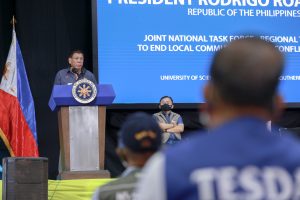Philippines President Rodrigo Duterte will never apologize for the suspected drug users and dealers killed during the six years of his bloody anti-drugs campaign, the leader said earlier this week.
In his first national address of the year on January 4, Duterte vowed to protect law enforcers doing their duty, and said they had a legitimate right to fight back when their lives were in danger, according to a report in the Manila Bulletin. “I will never, never apologize for the deaths of those bastards,” he said in English, before adding in Tagalog, “Kill me, imprison me, I will never apologize.”
Duterte’s campaign against illegal drugs has been the one constant of his dizzying and controversial term in office, and perhaps the only policy that he has implemented with any degree of consistency or determination. On the eve of his May 9, 2016 election victory, Duterte told a crowd of more than 300,000: “If I make it to the presidential palace I will do just what I did as mayor. You drug pushers, holdup men, and do-nothings, you better get out because I’ll kill you.”
He didn’t let them down. According to government data, more than 6,200 drug suspects were killed in anti-narcotics operations between June 2016, when Duterte took office, and November of last year. But human rights groups claim the real figure is much higher, putting it anywhere between 8,000 and 30,000, mostly consisting of urban poor drug users, and also including minors and infants.
Duterte’s unapologetic stance prompted immediate reactions from his many opponents. “Instead of humbling himself in the twilight of his miserable term, he has not asked for forgiveness for the thousands killed in his anti-poor war on drugs and for the billions of pesos that were lost every year to corruption,” labor leader Leody de Guzman, who is running for president in the May elections, wrote in a Twitter post.
Duterte also poured scorn on the notion that the “drug war” could fall under the purview of the International Criminal Court (ICC) in The Hague, from which he withdrew the Philippines in 2019. “If there is somebody who would try me, it should be a judge who is a Filipino because I’m a Filipino,” Duterte declared.
In September, the ICC authorized an investigation into the Philippines’ deadly “war on drugs” campaign, describing it as a “widespread and systematic attack against the civilian population.” On November 10, however, the Philippine government requested a deferral of the ICC’s investigation under the principle of complementarity, claiming that it had begun its own investigations into cases of extrajudicial killings that took place during “drug war” operations. The ICC is yet to rule on the request.
With Duterte’s term coming to an end in May, and the 76-year-old backing out of plans to run as vice president or for the Senate, a theoretical corridor to his prosecution in domestic or international courts could be about to open.
But a lot of political stars would have to align in order for Duterte to end up in the dock for his anti-narcotics campaign, starting with the defeat of his allies and associates at the presidential election in May. And given Duterte’s unapologetic stance, he could be expected to fight the attempt every step of the way.
































